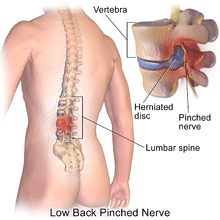Disc Prolapse!
Treatment of Disc Prolapse
Homeopathic Treatment of Disc Prolapse
Acupuncture Treatment of Disc Prolapse
Psychotherapy Treatment of Disc Prolapse
Conventional / Allopathic Treatment of Disc Prolapse
Surgical Treatment of Disc Prolapse
Dietary & Herbal Treatment of Disc Prolapse
Other Treatment of Disc Prolapse
What is Disc Prolapse
Symptoms of Disc Prolapse
Causes of Disc Prolapse
Risk factors of Disc Prolapse
Complications of Disc Prolapse
Lab Investigations and Diagnosis of Disc Prolapse
Precautions & Prevention of Disc Prolapse
Treatment of Disc Prolapse
Homeopathic Treatment of Disc Prolapse
Homeopathic treatment usually based on the symptoms that are presented in an individual case. It is able to treat intolerable pain in the back successfully. Following are some medicines for disc prolapse:
Ambra
Bryonia
Kali Carb
Calcarea flour
Lyco
Nux V
Sepia
Acupuncture Treatment of Disc Prolapse
Acupuncture can help break the cycle of pain and muscle spasm that often accompanies a herniated disk. It involves the use of fine needles inserted along the pathway of the pain to move energy through the body and relieve the pain.
Psychotherapy and Hypnotherapy Treatment of Disc Prolapse
Psychotherapy and hypnotherapy may be indicated to support the individual and identify associated factors that may contribute to the symptoms. A short course of cognitive pain management may be beneficial for individuals experiencing psychological distress or lack of improvement with treatment.
Conventional / Allopathic Treatment of Disc Prolapse
Epidural steroid injections have been used to decrease pain by injecting an anti-inflammatory drug, usually a corticosteroid. Painkillers such as paracetamol and ibuprofen is taken which you can buy at pharmacies. A stronger painkiller such as codeine is an option if anti-inflammatories do not suit or do not work well.
Surgical Treatment of Disc Prolapse
Surgery is necessary if there is no improvement in pain after conservative treatment has been tried for a few weeks to a few months. The aim of surgery is to cut out the prolapsed part of the disc. A specialist will advise on the pros and cons of surgery, and the different techniques that are available.
Dietary & Herbal Treatment of Disc Prolapse
Eat a High-Protein diet such as red meat, fish, fowl, seafood
Eat High-Fat Diet
Other Treatment of Disc Prolapse
Yoga would be very helpful for Disc Prolapse. There are many asanas which can really help you in your disc prolapse such as Dhanur Asana
What is Disc Prolapse?
Prolapse of bony structures of spine in between the vertebrae beyond its normal confines is called a disc prolapse. A prolapsed disc is sometimes called a herniated disc. Any disc in the spine can prolapse. However, most prolapsed discs occur in the lumbar part of the spine
Symptoms of Disc Prolapse
Back pain
Nerve root pain
Numbness or weakness in part of leg or foot.
Causes of Disc Prolapse
Sneezing
Awkward bending
Bending down to lift a heavy weight
Turning over to pick up something
Risk factors of Disc Prolapse
Lots of sitting
Lifting objects
Weight lifting
Cigarette smoking
Weight gain
Older age
Complications of Disc Prolapse
Long-term back pain
Heart problems, stroke and pneumonia
Loss of movement or sensation in the legs or feet
Blood clots in legs and lungs
Weakness or paralysis
Loss of bowel and bladder function
Diagnosis of Disc Prolapse
Your doctor diagnose a prolapsed disc from the symptoms. If the symptoms settle within a few weeks, no test is required. If symptoms persist, tests such as x-rays or scans may be advised. In particular, an MRI scan can show the site and size of a prolapsed disc. This helps decide the line of treatment- conservative or surgical
Precautions & Prevention of Disc Prolapse
Maintain a healthy weight
Regular exercise
Use the correct techniques for lifting.
Use good posture while standing or walking
Avoid smoking



+1.svg)
